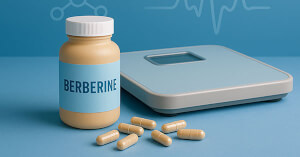
BerberineBenefits, Uses & Dosage
Berberine is an alkaloid used to regulate blood sugar, improve gut health, and support heart health.
Berberine is a plant alkaloid found in herbs like barberry, goldenseal, and Oregon grape. It has gained attention for its effects on blood sugar, lipid metabolism, and gut health.
Berberine may activate AMPK, a cellular enzyme involved in energy balance, which could help improve insulin sensitivity and cholesterol profiles. It is typically taken in capsule form, often standardized for potency.
Used to support metabolic health, berberine has shown promise in studies related to glucose control and inflammation. While evidence is growing, users should consult healthcare providers due to its strong pharmacological activity.
Other names & forms of Berberine supplement : berberine (barberry), berberis vulgaris, barberry, berberine extract, barberry root
Benefits
Berberine delivers clinically studied health benefits, particularly for glucose control, lipid metabolism, and digestive health:
- Helps regulate blood glucose levels, supporting Blood Sugar Support
- Supports healthy cholesterol and triglyceride levels, relevant to Heart Health
- May assist Weight Loss by improving insulin sensitivity and metabolism
- Contributes to Digestive Health due to its antimicrobial properties in the gut
Dosage
Individuals often adjust the dosage of Berberine supplement according to their specific health objectives:
- Blood sugar and cholesterol management: 900–1500 mg/day of Berberine, usually in 2–3 divided doses (e.g., 500 mg three times daily).
- Weight and metabolic support: Clinical studies use up to 1500 mg/day.
- Timing: Best taken before or with meals to maximize effectiveness.
- Recommendation: Avoid combining with other strong medications without professional supervision.
Side Effects
Berberine can help regulate blood sugar and support metabolic health, but you may notice a few mild side effects as your digestive system adapts. Look out for:
- Mild gastrointestinal discomfort, constipation, cramping, or diarrhea
- Possible nausea or abdominal pain when taken on an empty stomach
- Headache or lightheadedness in some individuals
- Rare rash or itchiness in those allergic to Berberis species
- Temporary mild decreases in blood pressure, leading to dizziness
Interactions
Possible interactions include:
- Antidiabetic medications: Berberine’s potent glucose-lowering effect can add to insulin or Cinnamon, increasing hypoglycemia risk, monitor blood sugar closely.
- Statins and cholesterol-lowering agents: Berberine may enhance CYP3A4 metabolism, affecting drugs like simvastatin or supplements such as Omega-3 Fish Oil; consider dose adjustments and monitor lipid levels.
- Anticoagulant and antiplatelet medications: By mildly inhibiting platelet aggregation, Berberine can compound warfarin or supplements like Garlic, raising bleeding risk.
- Cyclosporine and immunosuppressants: Berberine may increase blood levels of cyclosporine via P-glycoprotein inhibition; therapeutic drug monitoring is advised.
Precautions
Before starting Berberine, make sure none of these classes apply to you. If they do, seek medical advice first:
- Pregnant or breastfeeding women: Insufficient safety data; best to avoid or use only under medical supervision
- Individuals on blood sugar-lowering medications: Berberine can significantly lower glucose; monitor levels to avoid hypoglycemia
- People with low blood pressure: May cause further drops; check blood pressure regularly
- Those on cytochrome P450-metabolized drugs: Berberine can inhibit CYP enzymes; risk of drug interactions, review all medications with your physician
- Patients scheduled for surgery: May affect blood sugar and blood pressure during anesthesia; discontinue at least two weeks prior
Studies
These studies provide scientific insights into Berberine benefits:
A 2015 systematic review and meta-analysis of 14 RCTs found that berberine (500 mg three times daily) reduces HbA1c by 0.8 % (95 % CI: –1.0 to –0.6) and fasting glucose by 1.5 mmol/L (95 % CI: –1.8 to –1.2) in type 2 diabetic patients.
A 2014 randomized trial in 62 dyslipidemic adults showed 500 mg/day berberine for 12 weeks lowered LDL-C by 22 % and triglycerides by 35 % versus placebo and modestly increased HDL-C (P = 0.04).
A 2016 double-blind RCT found no significant weight loss or BMI change in obese subjects after 12 weeks of 1 g/day berberine versus placebo (ns), despite glycemic improvements.
A 2017 crossover study in healthy volunteers reported that a single 500 mg dose of berberine did not acutely affect postprandial insulin or free fatty acid levels versus placebo (ns).
This article was originally published on Stackbb.com, your trusted source for science-based supplement guides.
Related Articles

Important Disclaimer: The information provided on this page about Berberine supplement is for informational purposes only and has not been reviewed or validated by a medical professional. It is not intended to substitute professional medical advice, diagnosis, or treatment. Always consult your doctor or qualified healthcare provider before starting, stopping, or changing any supplement or part of your healthcare regimen. Individual needs and responses to supplements may vary, and what works for one person may not be appropriate for another.








